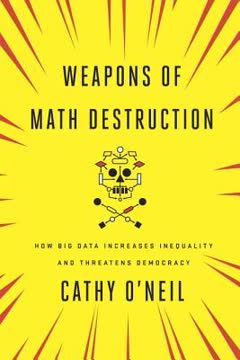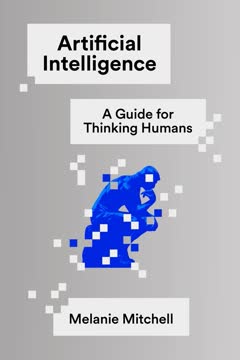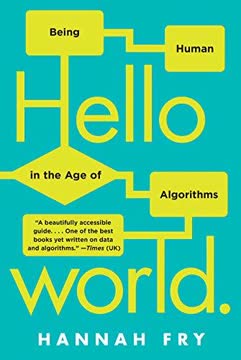Key Takeaways
1. Algorithms are reshaping our world, but human oversight remains crucial
"Algorithms will make mistakes. Algorithms will be unfair. That should in no way distract us from the fight to make them more accurate and less biased wherever we can – but perhaps acknowledging that algorithms aren't perfect, any more than humans are, might just have the effect of diminishing any assumption of their authority."
Ubiquitous influence. Algorithms have permeated nearly every aspect of modern life, from social media feeds to criminal justice systems. They offer unprecedented efficiency and insights but also raise concerns about accountability and fairness. As algorithms make increasingly important decisions, it's crucial to recognize their limitations and potential for error.
Human-algorithm partnership. The most effective use of algorithms involves human oversight and interpretation. Examples like the IBM Watson Jeopardy-winning machine demonstrate how algorithms can present multiple options with confidence levels, allowing humans to make informed decisions. In fields like medical diagnosis, algorithms excel at pattern recognition while human experts provide crucial context and judgment.
2. Data-driven decisions can perpetuate biases and invade privacy
"If data is the new gold, then we've been living in the Wild West."
Hidden biases. Algorithms trained on historical data can perpetuate existing societal biases. For example, recidivism prediction algorithms used in criminal justice may disproportionately label minority defendants as high-risk due to systemic inequalities in past arrest rates.
Privacy concerns. The vast amount of personal data collected by companies and governments raises significant privacy issues. Data brokers compile detailed profiles on individuals without their knowledge or consent, potentially leading to discrimination in areas like insurance or employment. The Chinese social credit system demonstrates the potential for algorithmic governance to infringe on personal freedoms.
Key privacy risks:
- Unauthorized data collection and sale
- Re-identification of anonymized data
- Predictive profiling based on personal information
- Government surveillance and control
3. Predictive policing and facial recognition raise ethical concerns
"How many Steve Talleys are we willing to accept in exchange for quickly identifying people like David Baril and Youssef Zaghba?"
Algorithmic policing. Predictive policing algorithms like PredPol aim to reduce crime by identifying high-risk areas for patrols. While they show promise in reducing overall crime rates, concerns exist about potential feedback loops reinforcing over-policing in certain neighborhoods.
Facial recognition limitations. Current facial recognition technology has significant error rates, especially when applied to large databases. Misidentifications can have severe consequences, as demonstrated by the case of Steve Talley, who was wrongly arrested based on an algorithmic match. The technology also raises privacy concerns about mass surveillance.
Ethical considerations:
- Balancing public safety with individual rights
- Addressing algorithmic bias in policing
- Ensuring transparency and accountability in law enforcement technology
- Setting appropriate thresholds for facial recognition accuracy
4. Healthcare algorithms show promise but face implementation challenges
"Watson doesn't have to remain a fantasy. But to turn it into reality, we'll need to hand over our records to companies rich enough to drag us through the slog of the challenges that lie between us and that magical electronic doctor."
Diagnostic potential. Machine learning algorithms have shown remarkable accuracy in tasks like identifying tumors in medical images, often outperforming human experts. These tools have the potential to improve early detection and diagnosis of diseases.
Implementation hurdles. Despite their promise, healthcare algorithms face significant challenges in real-world implementation. Issues include:
- Data quality and standardization
- Integration with existing healthcare systems
- Privacy concerns and data sharing
- Regulatory approval processes
- Physician and patient trust in algorithmic recommendations
The failure of IBM's Watson to live up to its initial hype in healthcare demonstrates the complexity of applying AI to medical decision-making. Successful integration of algorithms in healthcare will require collaborative efforts between technologists, medical professionals, and policymakers.
5. Self-driving cars highlight complexities of human-machine interaction
"Ironically, the better self-driving technology gets, the worse these problems become. A sloppy autopilot that sets off an alarm every 15 minutes will keep a driver continually engaged and in regular practice. It's the smooth and sophisticated automatic systems that are almost always reliable that you've got to watch out for."
Unexpected challenges. The development of self-driving cars has revealed unforeseen difficulties in creating fully autonomous vehicles. Issues include:
- Interpreting complex road scenarios
- Handling rare edge cases
- Interacting with human drivers and pedestrians
- Addressing ethical dilemmas (e.g., the trolley problem)
Human factors. As vehicles become more automated, new challenges arise in maintaining human drivers' engagement and skills. The "ironies of automation" suggest that as systems become more reliable, humans become less prepared to handle emergencies when they do occur.
Key considerations for autonomous vehicle development:
- Balancing automation with human control
- Designing intuitive human-machine interfaces
- Addressing legal and ethical responsibility
- Ensuring public trust and acceptance
6. Algorithms struggle with creative tasks and emotional intelligence
"Among all of the staggeringly impressive, mind-boggling things that data and statistics can tell me, how it feels to be human isn't one of them."
Limits of algorithmic creativity. While algorithms can produce music or art that mimics existing styles, they struggle with true innovation and emotional depth. Creative AI often relies on recombining existing elements rather than generating truly novel ideas.
Emotional intelligence gap. Algorithms excel at pattern recognition and data analysis but lack the emotional understanding that humans bring to fields like art, literature, and music. This limitation becomes apparent in attempts to create algorithmic art or literature that resonates on an emotional level.
Areas where human creativity remains superior:
- Generating truly novel ideas
- Understanding and conveying complex emotions
- Interpreting cultural context and nuance
- Producing art with deep personal meaning
7. Regulation and transparency are needed to harness algorithms' potential
"To my mind, the urgent need for algorithmic regulation is never louder or clearer than in the case of crime, where the very existence of these systems raises serious questions without easy answers."
Regulatory challenges. As algorithms play increasingly important roles in society, there is a growing need for regulation and oversight. Key issues include:
- Ensuring algorithmic transparency and explainability
- Protecting individual privacy and data rights
- Addressing bias and discrimination in algorithmic decision-making
- Establishing accountability for algorithmic errors
Balancing innovation and protection. Effective regulation must strike a balance between fostering technological innovation and protecting individual rights. This may involve creating new regulatory bodies or expanding existing ones to address the unique challenges posed by algorithmic systems.
Potential regulatory approaches:
- Mandatory impact assessments for high-stakes algorithms
- Public audits of algorithmic systems
- Clear guidelines for algorithmic transparency and explainability
- Mechanisms for individuals to challenge algorithmic decisions
8. Humans must learn to work alongside algorithms, not be replaced by them
"In the age of the algorithm, humans have never been more important."
Complementary strengths. The most effective use of algorithms involves leveraging their strengths while recognizing the unique capabilities of human intelligence. Examples like "centaur chess," where human players collaborate with AI, demonstrate the potential of human-algorithm partnerships.
Critical thinking and oversight. As algorithms become more prevalent, it's crucial for humans to develop skills in algorithmic literacy and critical thinking. This includes understanding the limitations of algorithms, questioning their outputs, and providing ethical oversight.
Key skills for the algorithmic age:
- Understanding basic principles of machine learning and AI
- Interpreting algorithmic outputs and recognizing potential biases
- Ethical reasoning and decision-making in algorithmic contexts
- Adapting to rapid technological change
The future of work will likely involve increasing collaboration between humans and algorithms, with each complementing the other's strengths. Embracing this partnership while maintaining human agency and ethical considerations will be crucial for harnessing the full potential of algorithmic systems.
Last updated:
FAQ
What's Hello World: Being Human in the Age of Algorithms about?
- Exploration of Algorithms: The book delves into how algorithms impact various sectors, including healthcare and criminal justice, and examines the balance between human decision-making and machine learning.
- Human-Machine Relationship: Hannah Fry discusses the partnership between humans and machines, highlighting both the enhancements and risks that algorithms bring.
- Real-World Examples: Through scenarios like driverless cars and judicial algorithms, Fry illustrates the real-world implications of relying on technology for decision-making.
Why should I read Hello World: Being Human in the Age of Algorithms?
- Timely Topic: As technology becomes more integrated into daily life, understanding algorithms is crucial. The book offers insights into their workings and societal impact.
- Engaging Writing Style: Fry's witty and approachable narrative makes complex topics accessible, using anecdotes and examples to engage readers.
- Critical Thinking: The book encourages readers to critically evaluate the technology they use and the decisions made by algorithms, fostering a more informed perspective.
What are the key takeaways of Hello World: Being Human in the Age of Algorithms?
- Algorithms Are Everywhere: Algorithms influence many life aspects, from healthcare to art, making understanding their function essential.
- Trust and Skepticism: Fry advocates for a balanced trust in algorithms, emphasizing awareness of their limitations and biases.
- Human Oversight is Essential: The importance of human judgment alongside algorithms is stressed, especially in high-stakes areas like criminal justice.
What are the best quotes from Hello World: Being Human in the Age of Algorithms and what do they mean?
- “The future doesn’t just happen. We create it.”: This quote underscores the active role humans play in shaping technology and society.
- “No object or algorithm is ever either good or evil in itself. It’s how they’re used that matters.”: It highlights the neutrality of technology, with ethical implications depending on human use.
- “We have somehow managed to be simultaneously dismissive of them, intimidated by them and in awe of their capabilities.”: This reflects society's complex relationship with technology, acknowledging both fear and fascination.
How does Hannah Fry define an algorithm in Hello World: Being Human in the Age of Algorithms?
- Basic Definition: An algorithm is defined as a step-by-step procedure for solving a problem, often by a computer.
- Types of Algorithms: The book categorizes them into rule-based and machine-learning types, explaining their functions.
- Real-World Applications: Fry illustrates their use in everyday tasks like search engines, emphasizing their pervasive role.
What ethical dilemmas are presented in Hello World: Being Human in the Age of Algorithms?
- Decision-Making in Crisis: Scenarios like driverless cars making moral choices raise questions about programming ethics.
- Bias in Algorithms: Algorithms can perpetuate existing biases, especially in criminal justice, raising fairness concerns.
- Privacy Concerns: The book discusses data collection implications, urging consideration of convenience versus privacy trade-offs.
How do algorithms impact healthcare according to Hello World: Being Human in the Age of Algorithms?
- Diagnostic Assistance: Algorithms can enhance diagnostic accuracy, such as in cancer detection, suggesting a crucial role in medical decision-making.
- Over-Diagnosis Risks: There is a warning about potential over-diagnosis from algorithmic screening, leading to unnecessary treatments.
- Data Integration Challenges: Difficulties in integrating healthcare data across systems can hinder algorithm effectiveness.
What role do algorithms play in the justice system as described in Hello World: Being Human in the Age of Algorithms?
- Risk Assessment Tools: Algorithms assess re-offending risks, influencing bail and sentencing, raising reliability questions.
- Inconsistency in Judgments: Algorithms could provide more consistent outcomes than human judges, but over-reliance is cautioned against.
- Ethical Implications: The book discusses moral dilemmas, emphasizing the need for human oversight in algorithmic decisions.
How does Hello World: Being Human in the Age of Algorithms address the concept of trust in algorithms?
- Trust vs. Skepticism: Fry advocates for a balanced trust in algorithms, recognizing their capabilities and limitations.
- Human Oversight Importance: Algorithms should not replace human judgment, especially in critical areas like healthcare.
- Awareness of Bias: Readers are encouraged to be vigilant about algorithmic biases, advocating for transparency and accountability.
What future implications does Hello World: Being Human in the Age of Algorithms suggest regarding algorithms?
- Shaping Society: Algorithms will continue to influence societal norms and values, making understanding their impact crucial.
- Need for Regulation: Thoughtful regulation is called for to ensure ethical use and protect individual rights.
- Human-Machine Collaboration: A future is envisioned where humans and algorithms work together, enhancing decision-making processes.
How does Hello World: Being Human in the Age of Algorithms address the concept of bias in algorithms?
- Bias in Data: Algorithms can perpetuate biases present in their training data, leading to unfair outcomes.
- Examples of Bias: The COMPAS algorithm in sentencing is highlighted as disproportionately affecting minority groups.
- Need for Transparency: Transparency in algorithmic processes is advocated to mitigate bias and improve fairness.
What is the significance of the Air France flight crash case in Hello World: Being Human in the Age of Algorithms?
- Human Error vs. Automation: The crash illustrates dangers of over-relying on automated systems, with pilots failing to regain control.
- Lessons Learned: The importance of training pilots to handle emergencies without solely relying on automation is discussed.
- Broader Implications: This case serves as a cautionary tale about automation's potential consequences, reinforcing the need for human skills.
Review Summary
Hello World explores the increasing role of algorithms in society. Fry examines their impact on various aspects of life, including justice, medicine, and art. She presents a balanced view, highlighting both benefits and potential dangers. The book is praised for its accessibility, humor, and thought-provoking content. Readers appreciate Fry's clear explanations and engaging writing style. While some find it lacks depth, most consider it an excellent introduction to the topic. The book encourages critical thinking about our relationship with technology and its future implications.
Similar Books







Download PDF
Download EPUB
.epub digital book format is ideal for reading ebooks on phones, tablets, and e-readers.





